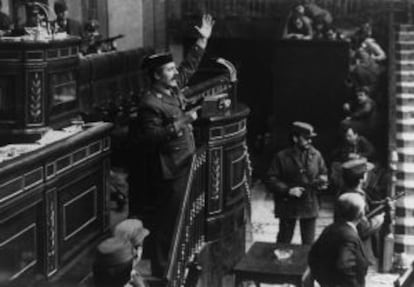Royal Household dismisses coup accusations
New book accuses King Juan Carlos of plotting to overthrow prime minister Adolfo Suárez in 1981


The Zarzuela Palace has issued a statement officially denying the accusations made in a new book that King Juan Carlos facilitated the failed coup of February 23, 1981.
“The conversations quoted in the book between the former prime minister and the monarch are pure fiction and are impossible to believe,” said the statement issued on April 3 in the wake of the publication of La gran desmemoria. Lo que Suárez olividó y el Rey prefiere no recordar (or, The great memory failure. What Suárez forgot and the king prefers not to remember) by journalist Pilar Urbano, which claims that in late 1980 King Juan Carlos brought about the resignation of the then-prime minister, Adolfo Suárez, who died last month, thus creating a political crisis that paved the way for the military coup the following February.
Urbano claims that the king supported a campaign among politicians and the military to get rid of Suárez and replace him with Alfonso Armada, an army general and close adviser to the monarch. The so-called Operation Armada was not the same as the 1981 coup attempt, although several key military figures were involved in both plots.
The Zarzuela’s rebuttal of the accusations came on the same day the book was launched, and followed denials by members of Suárez’s Cabinet quoted by Urbano in her book to substantiate her claims.
“The king was never behind the February 23 coup. He is the king, and only the king is able to stop a coup attempt,” reads a letter signed by senior political and military figures from the time, including Adolfo Suárez’s son.
The king was never behind the coup. Only the king can stop a coup attempt”
Thanking the signatories for their support, the statement by La Zarzuela highlighted what it calls their “defense of the institutional role of the king in his relationship with Prime Minister Suárez, which was based on mutual respect and reciprocal loyalty, as well as a sincere friendship on a personal level.”
On March 23, after the death of Suárez, King Juan Carlos made a videocast, saying: “My gratitude to the Duke of Suárez is deep and permanent, and my pain great, but pain is not an obstacle to recording and valuing one of the most brilliant chapters in the history of Spain: the transition to democracy, which was carried out by the Spanish people, and was driven by Adolfo and myself.”
“I am angry, but above all, sad,” Aurelio Delgado, brother-in-law and former personal secretary to Suárez, and one of the signatories to the letter dismissing Urbano’s claims, told EL PAÍS. “One has the obligation to respect the truth, but with the aim of selling more books, this obligation has been broken. It is simply opportunism,” he added. So far none of the signatories has said whether they intend to bring legal action against Urbano.
Former prime minister Felipe González, who was elected in 1982, and then served three consecutive terms, is also mentioned in the book. He too has dismissed Urbano’s claims. “She has zero credibility. She is a liar,” he said last week. Urbano claims that González was also part of the plot to overthrow the government, and that the military had offered him the position of deputy prime minister in return.







































